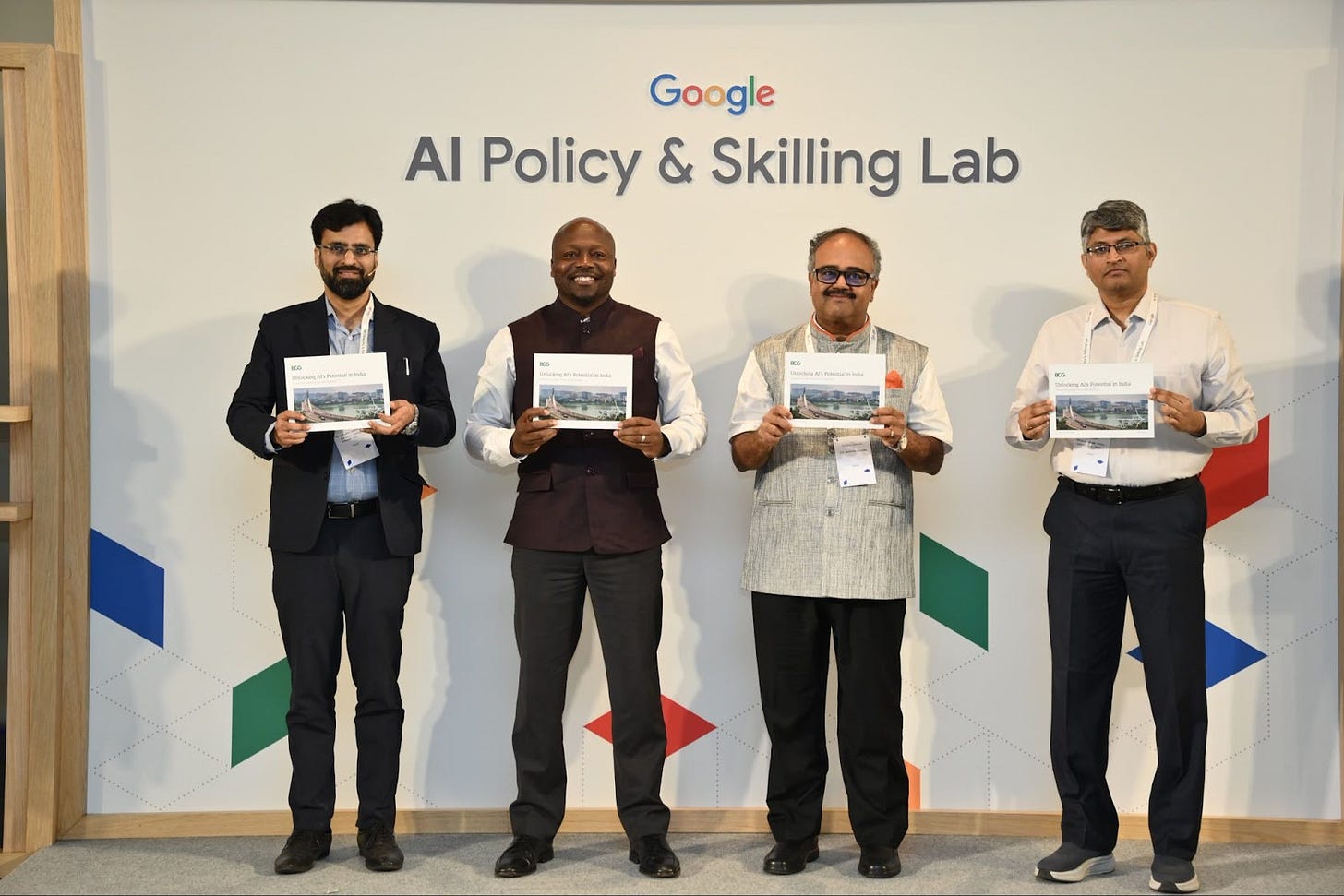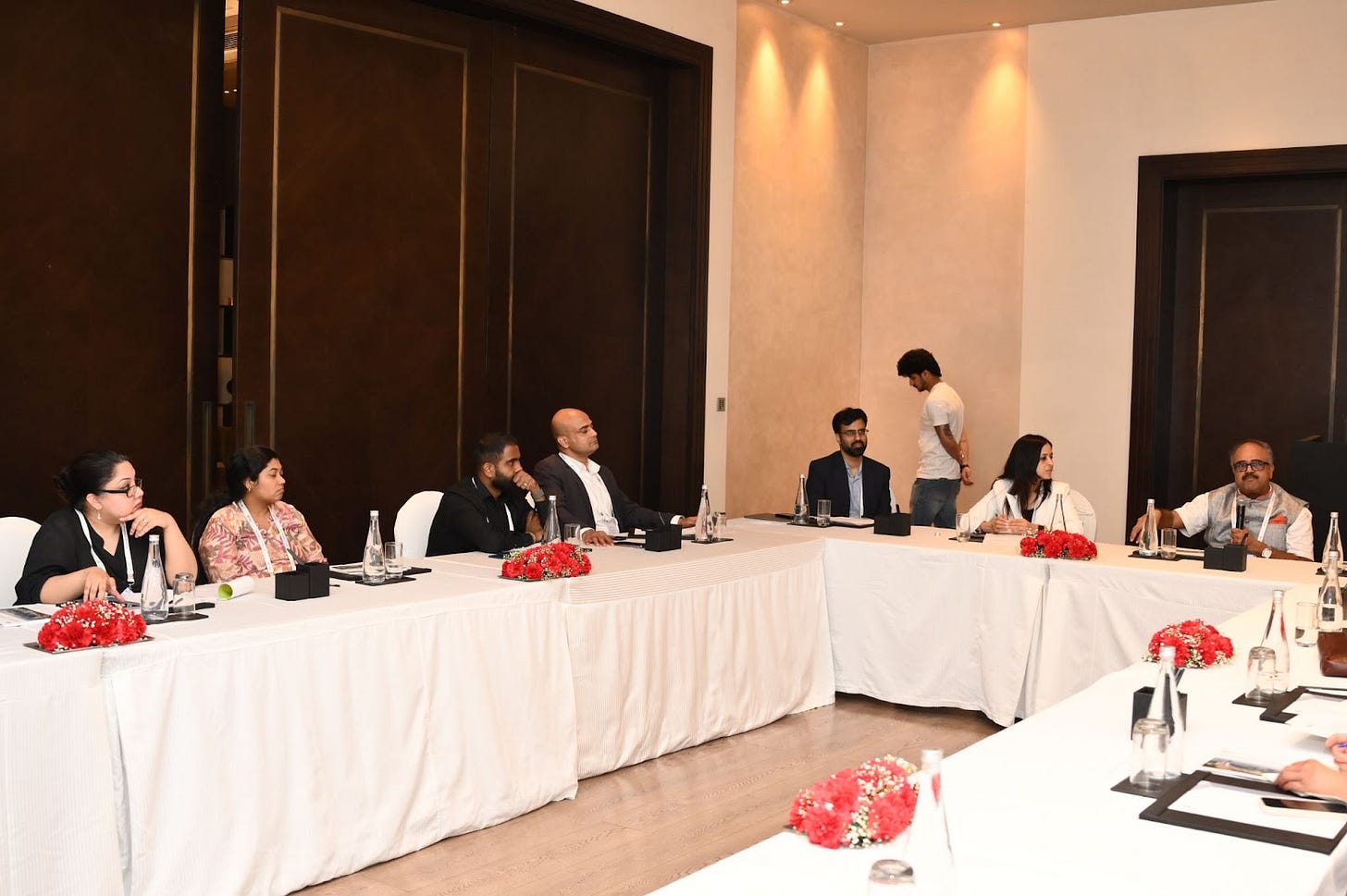Unlocking AI’s Potential in India
Launch of Report and Roundtable Discussions on Healthcare and Agriculture
On 18th March 2025 Boston Consulting Group launched their report titled “Unlocking AI’s Potential in India: Transforming Agriculture and Healthcare” during a closed-door event. The report aims to guide organizations to adopt and integrate AI in critical areas of healthcare and agriculture. The launch event organized by CeRAI and Google brought together key stakeholders from government, industry, academia, and civil society.
The event kicked off with opening remarks from Mr. Wilson White (Vice President of government affairs and public policy at Google) and Prof. Balaraman Ravindran (Head of CeRAI at IIT Madras). This was followed by a keynote address by Dr Karthik Adapa (Regional Adviser, Digital Health at WHO) and a briefing on the BCG report by Mr Siddharth Madaan (Managing Director at BCG). The sessions emphasized the “pilotitis” approach plaguing the current AI innovation sector, where multiple repeated pilots are conducted without any proof of the solution’s scalability– a desirable tenet in healthcare. The need to re-engineer public health services for AI implementation was noted. This requires a multi-pronged approach involving bettering existing digital infrastructures, upskilling healthcare workers, and developing interoperable solutions to reduce the digital fatigue brought on by numerous applications. The session ended by drawing attention to the divide between the global north and South in AI readiness within healthcare ecosystems. Despite a greater need for AI-driven solutions in the global South, it lags behind the global North which is better prepared for adoption owing to its technological advancement and domination creating an imbalance between those in need and those in power.
Two roundtable discussions (on healthcare and agriculture) were held to further the dialogue on topics from the keynote sessions and the observations from the BCG report. This blog provides key highlights from the roundtable on healthcare and agriculture
Healthcare
Contextually fitting and scalable AI solutions- Experts expressed concerns about the hype around AI and the need to focus on contextually fitting, high-impact and scalable AI solutions. Potential use cases proposed were GenAI for medical education, GenAI for improving information dissemination, and counter misinformation.
Focus on primary healthcare: Discussions were inclined towards the potential of AI to improve the primary health infrastructure, reducing the burden on tertiary health centres. Simultaneously, attention was drawn to training the healthcare workforce at the primary health centres to enable them to benefit maximally from the use of AI solutions.
Addressing the data issue in India– While there is no dearth of data in India, the data is often either inaccessible or incomplete. Experts highlighted that ICMR along with ArtPark at IISc plans to counter this issue through its MIDAS (Medical Imaging Datasets for India) initiative by developing India-specific, high-quality, standardized datasets.
Lack of institutional investment: India’s startup funding remains in its infancy since avenues for institutional investment and growth capital are lacking.
Gaps in digital health laws: Discussions highlighted gaps in the current laws/ acts governing digital data in India. Concerns were raised about the increased litigation in citizens if granted the right to the erasure or withdrawal of data as well as the inadequacy of the Digital Personal Data Protection Act in stating how sensitive data gathered for research and academic purposes will be protected.
Moving Forward: The Road Ahead
As the Indian health ecosystem advances in its AI adoption journey, there is a need to address current institutional challenges and anticipate challenges that AI will pose in future. The discussions implied the indirect but important role of governments in the successful adoption of novel technologies. Governments should proactively engage in creating “data solidarity” amongst creators, users, and beneficiaries of data. Data solidarity supports data use that creates public value while providing support to those harmed by the use of data. This calls for research on frameworks to assess AI readiness among different health settings, guide end-to-end implementation of AI systems in clinical workflows, and evidence-based validation and testing of AI solutions. There is also a growing call for clearer digital laws/policies that enable the standardization of AI governance while respecting the nuances of the health sector. The roundtable served as a valuable platform for enabling discussion on important subjects pertaining to AI’s potential in healthcare.
Agriculture
Agriculture is deeply interwoven with multiple sectors. The integration of AI into Indian agriculture offers transformative possibilities not just on the farmlands but across the entire agricultural value chain—from policy-making and financing to production, distribution, and market linkages.
Optimizing farmland practices with AI – Contrary to the belief that fragmented landholdings in India impede AI implementation, experts highlighted that monoculture practices prevalent across vast regions facilitate AI interventions but with numerous challenges.
Innovative marketplaces: Adding value beyond raw produce – Price volatility due to supply-demand mismatches within and across states poses significant challenges for farm produce in India. Experts mentioned that AI can predict market trends and optimize logistics, enabling the creation of value-added products and making a significant impact on the Agri supply chain of the nation. A highlighted example was the cooperative-led processing of tomatoes into puree, which helps stabilize prices, reduce wastage, and broaden the market.
Data interoperability: Bridging gaps for comprehensive agricultural solutions – Given India's diversity in farming practices and languages, data interoperability is crucial. AI can facilitate the translation of agricultural documents, integrate various data sources from government and private entities, and harmonize datasets to streamline agricultural processes. Experts emphasized the importance of data interoperability in preventing redundant efforts happening in silos.
Public-Private Partnerships to drive AI adoption – Another crucial insight was relying solely for government interventions may delay AI integration. The private sector, startups, research institutions, and Farmer Producer Organizations (FPOs) must take proactive steps to bridge the gap. The discussion explored the concept of Village Knowledge Centers and kiosks can serve as direct touchpoints for farmers, providing them actionable insights.
Financial Inclusion and AI-Enabled Microinsurance — Examples to support adoption of AI technology by smallholder farmers were discussed, how AI can bridge this gap by optimizing credit assessment models for farmers, enabling financial institutions to offer tailored loans based on AI-driven risk assessments. Additionally, AI can enhance microinsurance schemes with real-time risk evaluations.
AI-driven governance for agricultural development – Discussions highlighted the need for standardization of agricultural data, integration of multiple databases to have a effortlessly G2C interaction be it for identifying eligible farmers for a government scheme, seamlessly dispersing incentives through AI enabled DPI integrated to the nation’s Agri Stack, enable farmers to apply loan, understand real time market trends, demand and supply needs in their preferred language. Experts tried exploring ways to adopt decentralized approaches for governing AI models to foster trust by ensuring transparency and equitable access to technology by farmers across India and how AI can help governments achieve some of these goals.
A Cross-Sectoral Approach to AI in Agriculture
The roundtable underscored that AI’s potential in Indian agriculture extends far beyond farmlands—it must be viewed as an end-to-end enabler across governance, finance, logistics, and market accessibility. The success of AI in this sector hinges on addressing financial barriers, building trust through data standardization, fostering interoperability, and encouraging proactive collaborations between public and private entities.






